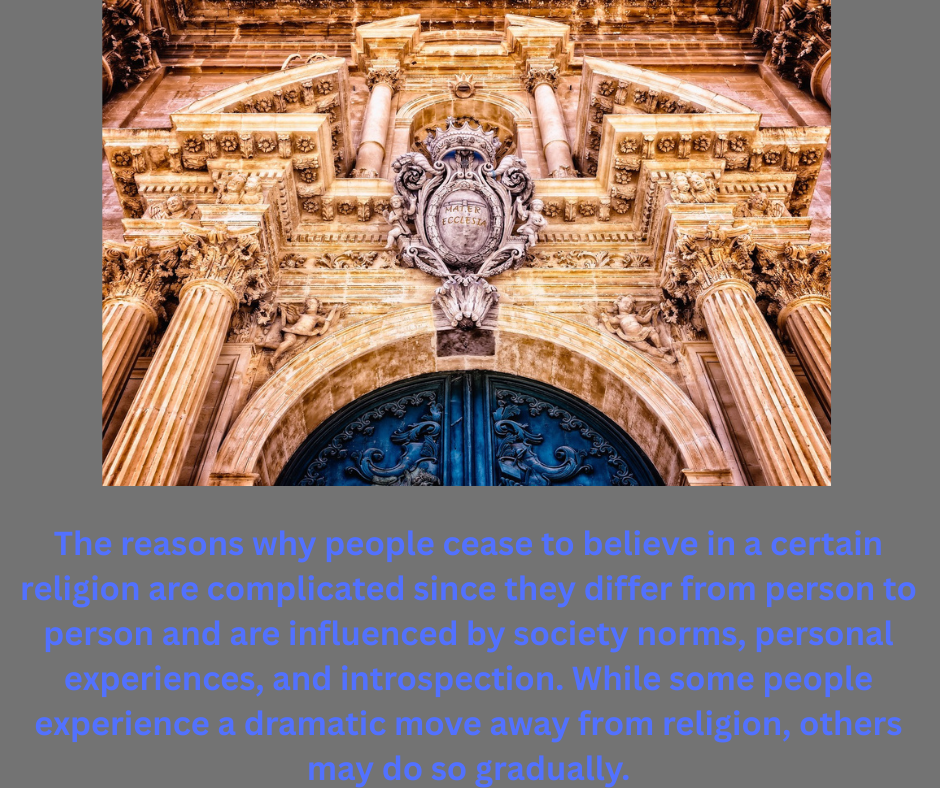People Not Accept Spirituality Easily but Spirituality can help people better understand the cosmos, a greater force, and their purpose in life. It is a very personal and transforming factor. Comfort, guidance, and a feeling of community can all be obtained from it.

But even with these advantages, a lot of individuals are reluctant to embrace spirituality or its practices. There are a number of reasons why some people oppose or reject spirituality, such as a dislike of spiritual concepts or a lack of interest in spiritual investigation. A variety of cultural, psychological, individual, and philosophical elements frequently influence these motivations.
Table of Contents
Rational and Scientific Worldview
Many people are greatly impacted by a logical and scientific worldview in the modern world, especially in the West. People Not Accept Spirituality Easily ,The rise of materialism and scientific investigation, which place an emphasis on logic, reason, and empirical evidence, has influenced how people view existence, life, and the nature of reality.
The presence of a greater power or an afterlife are two examples of abstract, non-material, and unprofitable ideas that many people find unreasonable, superfluous, or even nonsensical.
A sense of certainty and order that many people find more trustworthy than spiritual beliefs—which are frequently founded on faith and personal experience—is provided by science, with its emphasis on visible facts and reproducible findings.
The subjective nature of spirituality’s dependence on faith, mystical experiences, and personal interpretation can make it hard for people with a materialistic or scientific perspective to embrace. For some people, accepting spirituality as a legitimate and worthwhile part of their lives might be challenging due to the tension between the two worldviews—one based on faith and intuition, the other on facts and reason.
Fear of Losing Control or Autonomy
Adopting a spiritual lifestyle may seem like a loss of personal autonomy or control to some people. Many spiritual activities, particularly those found in organized faiths, call for a certain amount of deference to a higher authority, power, or set of laws. Individuals who place a great importance on their individuality and self-determination may find the notion of submitting one’s will to a heavenly force or adhering to prescribed spiritual activities intimidating.

Particularly in societies that place a strong emphasis on individualism and personal independence, the idea of “letting go” of control and placing one’s faith in something bigger than oneself may cause unease. People Not Accept Spirituality Easily ,The thought of submitting to spiritual activities or adopting a belief system may appear confining to people who have been conditioned to value independence and self-reliance.
This opposition to spiritual surrender might keep people from pursuing or embracing spirituality because they may think it will mean giving up their independence or fitting in with society’s expectations.
Negative Past Experiences with Religion or Spirituality
Having bad experiences with organized religion or spiritual activities in the past is one of the biggest obstacles to accepting spirituality. People who were up in a dogmatic, repressive, or judgmental religious environment may equate spirituality with feelings of shame, guilt, or dread. Whether it be physical, emotional, or spiritual abuse, people who have been abused or manipulated in religious environments frequently grow to distrust spiritual institutions or practices.
When religion or spirituality is employed as a means of punishment, coercion, or control, it can leave people with emotional scars that prevent them from pursuing spirituality in the future. For instance, some people might have been taught to feel immoral or undeserving, which might cause them to feel resentful or cut off from spiritual activities.
Instead of being emancipating or uplifting, these traumatic experiences can mold a person’s view of spirituality as something destructive or oppressive, which keeps them from embracing it later in life.
Furthermore, People Not Accept Spirituality Easily ,those who have seen or experienced hypocrisy in religious groups—such as leaders who behave in ways that are inconsistent with the principles they advocate—may grow skeptical of spirituality in general. The discrepancy between spiritual teachings and the actions of spiritual leaders or organizations may demoralize them and make them even less inclined to pursue spiritual ways.
Cultural and Societal Influences
Social expectations and cultural standards can also have a big impact on how open a person is to accepting spirituality. Spirituality may not be regarded as an essential or valuable aspect of daily life in many contemporary countries, especially those that are very secular or materialistic.
The significance of spiritual development or inquiry may be overshadowed by social pressure to adhere to materialistic values, such as monetary success, professional advancement, and personal accomplishment.
People may believe that spirituality is superfluous or unrelated to their life in these societies. This is especially true in fast-paced, urban settings where there is little opportunity for self-reflection or introspection.
People Not Accept Spirituality Easily . The focus on efficiency and production may leave little time for spiritual activities like prayer, meditation, or introspection, which could cause people to put more importance on surface-level issues than on more profound existential ones.
Furthermore, stigmas associated with culture can also fuel opposition to spirituality. Some cultures may consider spirituality to be a sign of ineptitude or weakness. The perception that spirituality is a pursuit best left to the “uneducated” or the downtrodden may deter others from pursuing it. Social pressure to abandon spirituality in order to conform to mainstream cultural norms may be experienced by those who are surrounded by people who do not respect it.
Psychological Factors and Personal Beliefs
Some people’s rejection of spirituality is also largely due to psychological reasons. The fear of uncertainty is one of the main psychological obstacles. Accepting life’s mysteries, embracing the unknown, and admitting that some questions may not have definitive answers are all common components of spirituality.
The ambiguity that comes with spirituality can be unnerving or uncomfortable for those who have a strong desire for structure and certainty in their lives.
Furthermore, spiritual activities that demand trust, faith, and surrender may be difficult for people with a strong need for control over their surroundings to embrace. They may feel unstable or powerless over the unpredictable nature of spiritual experiences, including transcendental moments or intense emotional releases, which makes them reluctant to pursue spirituality.
Cognitive dissonance is an additional psychological element. People may reject spirituality in order to ease the discomfort that arises from their views conflicting with spiritual concepts. It could be challenging for someone who values achievement and success in the practical world to reconcile these ideals with the spiritual emphasis on humility, surrender, and disengagement from material belongings.
They might completely reject or eschew spirituality in order to lessen the contradiction.
Furthermore, because spirituality frequently necessitates intense introspection and self-examination, some people may be resistant to it because they feel emotionally unprepared for it. Often, People Not Accept Spirituality Easily spiritual development entails facing emotionally challenging situations, traumatic experiences, or existential issues that can be painful or overpowering. Spirituality may feel overwhelming or daunting to people who are not yet prepared to go into their inner world.
Lack of Exposure or Understanding
Some people may find it challenging to embrace spirituality if they haven’t been exposed to spiritual activities or beliefs. A person may never be exposed to the idea of spiritual investigation if they grow up in a secular setting where spirituality is not valued or discussed. People could not consider spirituality to be a practical or significant choice if they are not exposed to other spiritual traditions, practices, or concepts.
People Not Accept Spirituality Easily ,Likewise, a lack of knowledge or comprehension regarding spiritual practices might keep people from appreciating the entire range of spirituality’s potential advantages. Some people may reject spirituality because they don’t know how to start practicing it or because they think it’s too esoteric or vague. In these situations, the absence of resources or direction can be a major obstacle to spiritual acceptance.
Fear of Change and Personal Transformation
Many times, spirituality necessitates personal change, which some people find intimidating. Accepting spirituality may entail facing one’s own difficult facts, letting go of long-standing habits, or questioning strongly held beliefs. One’s perspective on life, relationships, and the world can undergo significant changes as a result of spiritual growth, and for some people, this change can be frightening or uncomfortable.
For many people, People Not Accept Spirituality Easily ,change is inherently challenging, particularly when it entails a change in identity or perspective. The idea of needing to reassess one’s values, purpose, or objectives might cause resistance, anxiety, or a fear of the unknown. Therefore, in order to avoid the unpleasantness of personal growth, people may reject spirituality.
Conclusion
People do not readily embrace spirituality for a variety of reasons. These explanations stem from a variety of sources, including personal beliefs, cultural influences, psychological variables, prior experiences, and logical and scientific worldviews.
People Not Accept Spirituality Easily ,Even though spirituality can provide a great deal of comfort, meaning, and personal progress, it frequently necessitates a leap of faith, self-reflection, and the courage to face difficult realities. Because of this, spirituality may appear superfluous, nonsensical, or even dangerous to certain people.
